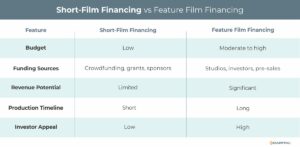
Short Film Financing: Securing Funds to Bring Your Creative Vision to Life
Content
- What Is Short Film Financing?
- Key Features of Short Film Financing:
- Why Short Film Financing Matters
- Methods of Short Film Financing
- Who Can Benefit from Short Film Financing?
- Benefits of Short Film Financing
- Challenges of Short Film Financing
- Real-World Example: Short Film Financing in Action
- How to Maximise a Short Film Budget
- Conclusion
- Key Takeaways
Short films play a crucial role in the UK’s cultural and creative industries, offering diverse voices and innovative artistic expressions. They serve as an essential medium for social commentary, cultural representation, and creative exploration, while providing a vital platform for emerging filmmakers. Whether highlighting societal issues, preserving cultural heritage, or pushing the boundaries of film as an art form, short films remain an influential and essential component of the UK’s film landscape.
Short films have long been a proving ground for filmmakers to hone their craft, tell impactful stories, and showcase their creativity. These productions are often independently produced (indie films) with limited resources. Despite their shorter runtime, these films require careful planning and adequate funding to bring a vision to life.
Short film financing is the critical process of securing the resources needed to cover the five stages of production, from development to distribution. This blog explores the unique challenges and opportunities of financing short films, the methods filmmakers can use to raise funds, and how to maximise the impact of a short film budget.
What Is Short Film Financing?
Short film financing is a type of business financing used to provide the financial resources necessary to produce a short film, typically ranging from 2 to 40 minutes in length. While short films generally have smaller budgets than feature films, securing reliable cash flow to acquire professional equipment, hire skilled crew members, and achieve high-quality post-production is just as important.
Key Features of Short Film Financing:
- Low-Budget Focus – Emphasis on cost-effective production strategies.
- Creative Vision – Funding is often secured based on the filmmaker’s unique vision and storytelling potential.
- Diverse Funding Sources – Includes grants, crowdfunding, sponsorships, and institutional support.
Why Short Film Financing Matters
While some short films are produced on micro-budgets with volunteer efforts, securing proper financing allows filmmakers to retain the trust of stakeholders and maximize opportunities to:
- Elevate Production Quality – Invest in better equipment, locations, and talent.
- Expand Creative Freedom – Execute ambitious ideas without being constrained by limited resources.
- Reach Broader Audiences – Cover marketing and distribution costs to showcase the film at festivals, streaming platforms, or local cinemas.
Methods of Short Film Financing
- Crowdfunding
- Filmmakers can raise small contributions from a large audience through platforms such as Kickstarter and Indiegogo.
- Film Grants
- Organisations such as the British Film Institute (BFI), Creative UK, and local arts councils offer grants to support short film projects with cultural, educational, or artistic value.
- Personal Savings
- Many filmmakers begin by investing their own money or pooling resources with collaborators.
- Sponsorships
- Partnering with brands or local businesses that align with the film’s themes can provide financial or in-kind support.
- Competitions and Development Labs
- Entering pitch contests or filmmaking workshops can secure funding and mentorship opportunities.
- University or Institutional Partnerships
- Collaborating with film schools or local arts institutions can provide access to equipment, funding, and student crew members.
- Revenue Sharing
- Offering investors or collaborators a share of potential festival prizes, licensing deals, or online monetisation.
Who Can Benefit from Short Film Financing?
Short film financing is essential for:
- Aspiring Filmmakers – Creating portfolio pieces to break into the UK film industry.
- Students – Producing high-quality graduation projects.
- Independent Filmmakers – Experimenting with new ideas, techniques, or storytelling formats.
- Established Directors – Using short films as proof-of-concept projects for larger productions.
Benefits of Short Film Financing
- Professional Production Standards
- Access to funding ensures films meet industry standards for cinematography, sound, and editing.
- Broader Audience Reach
- Well-funded films can afford festival submissions, marketing campaigns, and distribution strategies to reach global audiences.
- Industry Networking Opportunities
- Financing often involves engaging with producers, distributors, and industry professionals, fostering valuable connections.
- Proof of Concept for Future Projects
- A professionally produced short film can attract investors, studios, or funding for feature-length projects.
- Creative Fulfilment
- Securing adequate resources allows filmmakers to fully realise their creative vision.
Challenges of Short Film Financing
- Limited Budget Constraints
- Even with financing, short films often operate on tight budgets, requiring careful prioritisation of expenses.
- Securing Funds
- Convincing backers to invest in a non-commercial, low-return project can be difficult.
- Competition for Grants
- Film grants in the UK are highly competitive and often require extensive applications.
- Time Constraints
- Crowdfunding campaigns and sponsorship negotiations can delay production timelines.
- Revenue Generation Challenges
- Short films typically generate limited revenue, making them less attractive to traditional investors.
Real-World Example: Short Film Financing in Action
Scenario: A UK-based filmmaker has a £15,000 budget to produce a 15-minute short film exploring environmental conservation. They need funds for equipment rental, location permits, and post-production.
Solution: The filmmaker raises £7,000 through a Kickstarter campaign by offering eco-friendly merchandise and behind-the-scenes access as perks. They secure a £5,000 grant from a local arts council and a £3,000 sponsorship from a sustainable outdoor brand.
Outcome: The film is produced on budget, receives critical acclaim at festivals, and gains traction on streaming platforms, sparking interest in a feature-length adaptation.
How to Maximise a Short Film Budget
- Write for Budget
- Craft a script that minimises costly elements like multiple locations, stunts, or elaborate sets.
- Leverage Local Resources
- Use local talent, locations, and equipment rentals to reduce expenses.
- Focus on Core Quality
- Prioritise spending on elements that directly impact the film’s quality, such as cinematography and sound design.
- Collaborate with Emerging Talent
- Partner with students or early-career professionals willing to work at reduced rates for experience.
- Plan for Distribution
- Allocate part of the budget for festival submissions, marketing, and online release.
Conclusion
Short film financing requires a balance of creativity, resourcefulness, and business acumen. While securing funds for a short film can be challenging, the process also offers opportunities to build industry connections, refine your craft, and showcase your talent on a global stage.
By leveraging diverse funding methods, maximising budgets, and presenting a strong creative vision, UK filmmakers can bring their stories to life and leave a lasting impact on audiences and the film industry. Whether you’re a first-time director or an experienced filmmaker, short film financing can be the first step toward turning your ideas into cinematic achievements.
Contact us to assess your film company’s best approach to overcoming funding constraints and ensuring reliable financing to meet production goals.
Key Takeaways
- Short films serve as a vital tool for social commentary, cultural representation, and creative exploration, while providing a platform for emerging UK filmmakers.
- Despite their shorter runtime, these films require careful planning and adequate funding to bring a vision to life.
- While short films generally have smaller budgets than feature films, the need for reliable cash flow to acquire professional equipment, skilled crew, and high-quality post-production remains the same.
- Short film financing is the critical process of securing the resources needed to cover all stages of production, from development to distribution.



